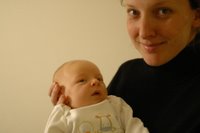 The Second Big Goof: The Montessori Baby at Palau de la Music, Barcelona
The Second Big Goof: The Montessori Baby at Palau de la Music, BarcelonaKent, Nuvy and I spent the past ten days in Barcelona on vacation with my parents. It was the second trip for me, the first for Nuvy and my parents, and Kent's parents live there in the winter. I probably have several posts in me about the trip...
Boys and girls, I would say, "let this be a lesson to you," but no parent in her right mind needs this lesson. You will all rightly say of me, "that lady is out of her mind," which precisely sums up the looks on the faces of the music devotees of the fair city of Barcelona, when they saw me saunter past the ticket counter of the Palau de la Music, the spectacularly beautiful Art Nouveau concert hall, with my two-and-a-half-month-old angel.
Now, before you send the butterfly nets and white coats (wait, no, don't click away!) let me just say that Nuvy is a very VERY mellow chick. Since she fell in love with her left thumb two significant things have happened:
1) Her right hand has struck up a feverish affair with the right ear, and deserves every happiness I think, jilted as it was.
2) Nuvy has stopped crying.
Seriously. This child now cries maybe once every other day, or whines for the 15 seconds it takes her to find the thumb. When alert, she coos and gurgles and charms the socks off of everybody--including any nearby bevy of flight attendants-- she can reach. When hungry, she sucks the thumb loudly, pulls her right ear, and closes her eyes tight. When sleepy, she moves the thumb from side to side in her mouth and tries to stick her fingers in her eyes. The child can communicate all her needs through the conduit of the thumb. Frankly, this is starting to freak me out a little, but my point is that I thought I had a pretty good chance of getting through a short concert.
The people at the concert could be, loosely, visually divided into three categories: middle-aged locals, elderly locals, and tourists. The middle-aged locals were fur-collar clad forty and fifty-somethings with careful coiffure and snappy-looking shoes. They usually appeared in couples or fours and were openly hostile to me, an obvious tourist and obvious lunatic for bringing a baby to a concert.
The tourists looked dirty, wore comfortable walking shoes, khakis and fanny or backpacks, and looked self conscious and a little alarmed that I was about to give them all a bad rap for being rude, loud, and marginally insane.
The little-old-ladies and gentlemen were pulling for me. They were dressed as if they were going to the market, came in threes, twos, or alone, and were visibly and actively delighted to see Nuvy, and seemed to enjoy my confidence and pluck in having brought this potentially dramatic little inconvenience out, just so we could all enjoy some good music. Perhaps there was a glimmer of the bullfight in their gleeful grins, but they were unfailingly encouraging. After each number, several of them would look back at me--in my aisle seat by the door--with silent applause and encouraging nods.
She made it all the way through the Mozart, the snoring of sleeping adults was louder, and was the belle of the intermission, drawing crowds of little old ladies who tested the limits of my spanish (Si, gracias. Si, una nena. Dos meses y media. Si, se gusta la musica) telling me how guapa she is (oh, and she is!) and asking about her vital statistics. The second act was a Hayden mass, a glorious chorale. She started to squirm at around the sixth of the seven pieces, so I took her out into the side aisle, not quite ready to leave, and thinking my swaying might keep her quiet. The piece, a solemn, quiet appeal for forgiveness, ended. She wound up for a whine and I took her out into the lobby. There, she let fly the single most piercing wail I have ever heard from her, and no amount of anything would bring an end to her solo performance. I spent the last 15 minutes or so (last number and encore) nursing her in the high-design, marbly bathroom. What I had envisioned as my moment of triumph, all the old ladies cheering, all the middle-aged scowlers and tourists grudgingly acknowledging the superiority of my fantasy child, became a scramble to duck out of the music hall quietly (there was nothing quiet about us!) and avoid the judging eyes that knew it was a bad idea from the start.
This exercise was the very antithesis of "follow the child". Maria Montessori would give me a good talking-to for having taken Nuvy there with the express intent of keeping her quiet, relying on my ability to predict and control her behavior to allow her to succeed in a wildly inappropriate setting. She really did almost make it, and if she had, I would have missed that lesson. To follow the child is to decline to burden her with your expectations. The "better" her behavior is, the harder it is to do. It was so easy for me to expect my tiny baby to behave appropriately in an adult-oriented setting. She had done it so many times before! I think this is a dangerous cycle for "good" kids. Adults just kind of forget what it's appropriate to expect--forget the reality of the child. I think this probably gets even worse as the child gets older, as adults have more direct influence over the child's behavior (through praise, punishment, scheduling, etc.) The well-behaved, obedient child finds herself in a pressure cooker of rising expectations. I hope this experience will help me remember that.





